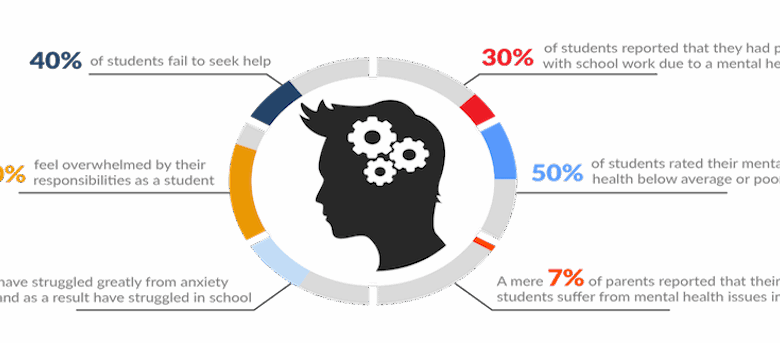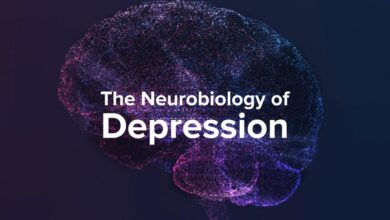
College frosh mental health is a critical topic, as the transition to college life can be incredibly challenging for first-year students. This period is marked by significant adjustments in academics, social circles, and independence. Many freshmen experience a range of emotions, from excitement and anticipation to anxiety and uncertainty. Understanding the common struggles, specific mental health concerns, and available support systems is crucial for navigating this pivotal time.
This exploration delves into the complexities of freshman adjustment, examining the various factors contributing to mental health challenges. We’ll explore common issues like anxiety and depression, discuss the pressures of social and academic life, and examine how to foster resilience and well-being in this crucial stage of development. We’ll also shed light on the importance of recognizing and combating the stigma surrounding mental health issues, highlighting the importance of seeking help.
Defining Freshman Adjustment
Stepping into the collegiate world is a significant transition, often filled with excitement, but also with anxieties and challenges. First-year students face a unique set of adjustments that can significantly impact their well-being. This exploration delves into the common hurdles, emotional responses, and varying experiences across different demographics. Understanding these factors is crucial for supporting students as they navigate this pivotal period.Freshman adjustment is a complex process encompassing multiple dimensions.
It involves adapting to academic demands, establishing new social connections, and managing the independence and responsibility that come with living away from home. The emotional and psychological toll can be considerable, impacting everything from self-esteem to sleep patterns. These adjustments are further shaped by factors like socioeconomic background, gender identity, and racial experiences, creating a diverse tapestry of freshman experiences.
Common Challenges Faced by First-Year College Students
College life presents a myriad of challenges that can affect students’ well-being. These range from academic pressures to social anxieties and the emotional adjustments of independence. Academic expectations often differ significantly from high school, requiring new study habits and time management skills. The sheer volume of information and the pace of coursework can lead to stress and feelings of overwhelm.
Social adjustments also play a significant role, as students navigate new social circles, relationships, and group dynamics. This includes forming new friendships, dealing with potential loneliness, and understanding differing social norms.
Typical Emotional and Psychological Adjustments
First-year students often experience a range of emotional responses as they adapt to college life. These can include feelings of anxiety, stress, homesickness, and even depression. Adjusting to independence can lead to feelings of isolation, loneliness, and uncertainty. These emotional responses are often amplified by the academic and social pressures of college life. Students might experience feelings of inadequacy or self-doubt, especially when faced with academic setbacks or social challenges.
Maintaining a positive self-image and self-care practices become crucial during this transition.
Differences in Adjustment Experiences Across Demographic Groups
Adjustments to college life are not uniform across all demographics. Socioeconomic factors, gender, and racial backgrounds significantly influence a student’s experience. Students from lower socioeconomic backgrounds may face financial anxieties and stress related to housing, food, and other necessities. Gender differences can also impact social interactions and expectations, while racial and ethnic experiences can lead to unique stressors related to cultural adjustment and discrimination.
Factors Contributing to Freshman Adjustment Difficulties
Understanding the factors contributing to freshman adjustment difficulties allows for more targeted support. The table below summarizes key factors and their potential impact on mental well-being.
| Factor | Description | Potential Impact on Mental Well-being |
|---|---|---|
| Academic Pressure | Increased workload, high expectations, and the pressure to succeed can lead to stress, anxiety, and feelings of inadequacy. | Elevated stress levels, anxiety disorders, difficulty concentrating, sleep disturbances, and potentially impacting mental health. |
| Social Adjustment | Navigating new social circles, making friends, and managing relationships can be challenging, leading to feelings of loneliness or isolation. | Social anxiety, loneliness, depression, and difficulty forming healthy relationships. |
| Financial Concerns | Lack of financial resources can lead to stress, anxiety, and financial instability, impacting daily life and well-being. | Financial stress, impacting mental health, affecting academic performance, and hindering ability to participate fully in college life. |
| Homesickness | Missing family and home environment can lead to emotional distress and difficulties in adapting to college life. | Emotional distress, anxiety, depression, and difficulty focusing on academic and social pursuits. |
| Cultural Differences | Adapting to a new cultural environment can be challenging, leading to feelings of isolation or cultural shock. | Cultural shock, difficulty in communication and social interaction, potential mental health issues, including anxiety and depression. |
Mental Health Concerns Specific to Freshmen
The transition to college life is a significant life change, often marked by increased independence, academic pressure, and social adjustments. This period of significant transition can be particularly challenging for freshmen, potentially impacting their mental well-being. Understanding the common mental health concerns specific to this stage can help students and support systems effectively navigate these difficulties.The freshman year of college presents a unique set of challenges that can contribute to heightened mental health concerns.
Navigating college as a freshman can be tough on mental health, especially with the pressure to succeed academically and socially. It’s a time of immense change and adjustment, and the stress can be overwhelming. While the struggles of young adults are complex, recent research into alternative treatments, like Dr. Faustman’s controversial diabetes cure research continues, dr faustmans controversial diabetes cure research continues , prompts a deeper look at the potential for innovative approaches to support overall well-being, including mental health, during this challenging transition period.
It’s important to remember that mental health is just as important as physical health for these students.
Students are often navigating a new environment, developing independence, and adjusting to the demands of academic rigor. This period of significant change can lead to feelings of anxiety, depression, and stress, as individuals adapt to their new realities.
Common Mental Health Concerns
Freshman year is a time of significant adjustment and exploration. Students face academic pressure, social adjustments, and the responsibility of managing their own schedules and resources. This often leads to a higher prevalence of anxiety, depression, and stress compared to other college years. These concerns can significantly impact academic performance, social interactions, and overall well-being.
Potential Causes and Triggers
Several factors can contribute to the heightened mental health concerns experienced by freshmen. Increased academic workload, the pressure to succeed, and the fear of failure are common triggers. New social environments, the need to build new relationships, and the experience of homesickness can also contribute to stress and anxiety. The transition from a structured high school environment to a more independent college setting can be overwhelming for some students.
Prevalence of Mental Health Issues
Studies consistently show that freshmen report higher rates of anxiety and depression compared to upperclassmen. This is likely due to the multitude of stressors associated with the transition to college life. For example, one study found that 20% of freshmen reported experiencing symptoms of anxiety, compared to 15% of sophomores and juniors. This suggests that the initial adjustment period is a crucial time for addressing mental health needs.
Symptoms and Treatment Options
| Mental Health Issue | Symptoms | Treatment Options |
|---|---|---|
| Anxiety | Excessive worry, restlessness, rapid heartbeat, difficulty concentrating, sleep disturbances, and physical symptoms like stomach aches. | Therapy (cognitive behavioral therapy, or CBT), medication (anti-anxiety medications), stress management techniques, and lifestyle changes. |
| Depression | Persistent sadness, loss of interest in activities, changes in appetite or sleep patterns, feelings of hopelessness or worthlessness, and difficulty concentrating. | Therapy (CBT, interpersonal therapy, or psychodynamic therapy), medication (antidepressants), support groups, and lifestyle changes. |
| Stress | Feeling overwhelmed, tense, or irritable. Physical symptoms can include headaches, muscle tension, and fatigue. | Stress management techniques (deep breathing exercises, mindfulness, time management), therapy, exercise, and healthy lifestyle choices. |
“Early intervention and access to support systems are crucial for mitigating the impact of these concerns on freshmen’s academic and personal lives.”
Social and Academic Pressures
The transition to college is a significant life change, marked by both exciting opportunities and considerable pressure. Freshmen often find themselves navigating a new social landscape while simultaneously grappling with the academic demands of higher education. Understanding these pressures is crucial for fostering a healthy adjustment and preventing potential mental health challenges.College life brings a unique blend of social and academic expectations.
Students face the challenge of forming new friendships, finding their place within a social network, and potentially navigating romantic relationships in an unfamiliar environment. Simultaneously, they encounter rigorous academic demands, including demanding course loads, frequent assessments, and the expectation of academic excellence. These pressures can be overwhelming for individuals who lack coping mechanisms or appropriate support systems.
Social Pressures Faced by Freshmen
The social landscape of college can be daunting for freshmen. The desire to fit in and build meaningful connections can create considerable stress. Navigating social hierarchies, finding compatible friends, and establishing a sense of belonging are common challenges. These challenges can sometimes be amplified by the presence of social media, where idealized versions of college life can be presented.
Academic Pressures of College Life
The academic rigor of college is often more intense than high school. Students encounter a heavier course load, requiring significant time investment in studying and completing assignments. Exams and quizzes are more frequent and often carry higher weight, leading to heightened anxiety and stress. The pressure to maintain good grades and meet academic expectations can significantly impact mental well-being.
Furthermore, students may experience challenges adjusting to new learning styles and teaching methodologies.
How Social and Academic Pressures Contribute to Mental Health Struggles
The cumulative effect of social and academic pressures can contribute to a range of mental health concerns. Feeling overwhelmed, anxious, or depressed are common reactions to these pressures. The inability to manage stress effectively can lead to burnout, procrastination, and difficulties concentrating on academic work. Isolation, loneliness, and feelings of inadequacy can also arise from navigating social dynamics and academic challenges.
Navigating college as a freshman can be tough on mental health, and one major stressor is often financial worries. Figuring out how to manage your money while balancing classes, social life, and extracurriculars can be overwhelming. This often leads to sleep problems, impacting your overall well-being. Learning how to manage financial stress can make a huge difference.
For example, exploring strategies to better budget and understand your spending habits, as outlined in this helpful article on how financial stress affects sleep and what you can do about it , is key to getting a good night’s rest and ultimately coping with the pressures of college life. Ultimately, prioritizing mental health is crucial for all freshmen.
Strategies for Managing Social and Academic Pressures
Effective strategies are essential for managing the pressures of college life. Time management plays a critical role in balancing social life, academics, and personal well-being. Students can benefit from creating realistic schedules that allocate time for classes, studying, socializing, and self-care.
Time Management Strategies
A well-structured schedule is crucial for navigating the demands of college life. Prioritize tasks, break down large assignments into smaller, manageable parts, and use a planner or digital calendar to track deadlines.
Study Techniques for Success
Developing effective study habits is essential for success in college. Employing active recall, spaced repetition, and utilizing various study methods (e.g., flashcards, mind maps, or group study sessions) can enhance understanding and retention.
Stress Reduction Techniques
Managing stress is vital for maintaining mental well-being. Engaging in relaxation techniques like deep breathing exercises, meditation, or yoga can help reduce anxiety and promote a sense of calm. Adequate sleep, a balanced diet, and regular physical activity are also important components of stress management.
| Strategy | Description | Example |
|---|---|---|
| Time Management | Creating a schedule and prioritizing tasks. | Allocating specific study time for each subject and sticking to the schedule. |
| Study Techniques | Employing active recall and spaced repetition. | Using flashcards to review material and scheduling study sessions with classmates. |
| Stress Reduction | Engaging in relaxation techniques and prioritizing self-care. | Taking breaks during study sessions, practicing mindfulness, or engaging in hobbies. |
Support Systems and Resources
Navigating the challenges of college life, especially as a freshman, can be overwhelming. It’s crucial to recognize that seeking help is a sign of strength, not weakness. Understanding the various support systems available can make a significant difference in successfully managing the stresses and anxieties associated with this transition. This section will explore the different avenues for support, highlighting their strengths and limitations, and ultimately empowering students to access the resources they need.
Available Support Systems
A multitude of support systems are designed to assist freshmen in navigating the unique challenges of college life. These resources range from campus-based services to personal networks, each offering a distinct approach to support. Effective utilization of these systems can help mitigate mental health issues, fostering a more positive and productive college experience.
- Campus Counseling Services: These services often provide confidential individual and group therapy, as well as crisis intervention. Counselors are trained professionals equipped to address a wide range of mental health concerns, from anxiety and depression to stress management and relationship difficulties. They can offer coping mechanisms, strategies for stress reduction, and valuable insights into personal growth. The support from campus counselors is particularly important for students who may be experiencing significant challenges or who might not feel comfortable confiding in family or friends.
- Peer Support Groups: These groups allow students to connect with others facing similar experiences. Sharing stories, exchanging coping strategies, and building camaraderie within a supportive environment can significantly reduce feelings of isolation and promote a sense of belonging. Peer support groups offer a valuable platform for mutual understanding and shared problem-solving. The familiarity and shared experience among peers can make these groups highly effective in providing emotional support and encouragement.
- Family Support: Family plays a crucial role in a student’s well-being, especially during challenging times. Open communication, understanding, and active listening from family members can provide a vital support network. Strong family bonds can offer a sense of stability and emotional security, allowing students to navigate the complexities of college life with greater confidence and resilience. Regular communication and proactive support from family members are essential for students’ mental health.
- Academic Advising: Academic advisors can provide guidance on course selection, time management, and academic strategies. They can help students understand their academic strengths and weaknesses, enabling them to develop a personalized approach to learning and success. This proactive support can reduce stress and anxiety associated with academic pressure, leading to improved mental well-being.
Comparing Support System Effectiveness
The effectiveness of different support systems varies depending on individual needs and circumstances. Campus counseling services provide professional guidance, but they may have limited availability or wait times. Peer support groups offer a sense of community but may not be suitable for all students, especially those who prefer individual attention. Family support is often a crucial resource, but its effectiveness hinges on the quality of the relationship and the willingness of family members to offer support.
Academic advising, while primarily focused on academic concerns, can also have a positive impact on mental health by reducing academic-related stress.
Resources for Mental Health Support
| Institution | Contact Information | Services Offered |
|---|---|---|
| University Counseling Center | (123) 456-7890 | Individual and group therapy, crisis intervention, workshops on stress management and anxiety reduction |
| Student Health Services | (987) 654-3210 | Mental health assessments, referrals to specialists, support for students with diagnosed conditions |
| Peer Support Group (e.g., “Fresh Start”) | Find on university website or student organization listings | Workshops, group meetings, social events |
| Student Affairs Office | (555) 123-4567 | Information on available resources, referrals to support services, workshops |
Promoting Well-being and Resilience

Navigating the transition to college can be overwhelming for freshmen. Facing new academic demands, social pressures, and the independence of living away from home, many freshmen experience anxiety, stress, and feelings of isolation. Developing resilience and strategies for well-being is crucial for successful adaptation and a positive college experience.Building resilience is not about eliminating all stress, but rather about learning to manage it effectively.
This involves cultivating coping mechanisms, prioritizing self-care, and fostering a supportive network. College freshmen can proactively take steps to develop these essential skills to thrive during this pivotal time.
Strategies for Fostering Resilience
Resilience is the ability to adapt and recover from difficult situations. College freshmen can cultivate resilience by actively engaging in healthy coping strategies. This involves a proactive approach to challenges rather than simply reacting to them.
- Identifying and Managing Stressors: Recognizing the sources of stress is the first step towards managing them. Common stressors for freshmen include academic pressure, social anxieties, financial concerns, and homesickness. Identifying these stressors allows freshmen to develop targeted strategies to address them. For instance, a student struggling with academic pressure can create a study schedule and seek help from professors or tutoring services.
- Building a Support Network: Establishing connections with peers, professors, and mentors can provide crucial emotional support. Joining clubs, attending campus events, and seeking out academic advisors can facilitate these connections. This support network can provide encouragement, advice, and a sense of belonging, particularly when facing challenges.
- Practicing Self-Compassion: Treating oneself with kindness and understanding is essential. Freshmen should learn to acknowledge their own limitations and mistakes without judgment. Practicing self-compassion helps to reduce self-criticism and promotes a more positive self-image, which is vital for resilience.
Stress Management Techniques
Effective stress management is key to maintaining well-being. College freshmen experience significant stress from various sources, including academic pressure, social expectations, and personal responsibilities.
- Mindfulness and Meditation: Mindfulness practices, such as meditation and deep breathing exercises, can help to manage stress by promoting focus and reducing anxiety. These practices can be incorporated into daily routines to create a sense of calm and reduce the impact of stress. For example, setting aside 10-15 minutes each day for mindfulness exercises can be highly beneficial.
- Time Management Strategies: Effective time management is crucial for minimizing stress. Creating schedules, prioritizing tasks, and breaking down large projects into smaller, manageable steps can greatly reduce feelings of overwhelm. This includes allocating dedicated time for studying, socializing, and personal activities.
- Healthy Coping Mechanisms: Developing healthy coping mechanisms is essential. These include engaging in physical activity, spending time in nature, pursuing hobbies, and engaging in creative activities. Finding healthy outlets for stress and emotions is important for maintaining mental well-being.
Time Management Strategies
Time management is vital for college freshmen to balance academic responsibilities, social life, and personal well-being. Poor time management can lead to increased stress and decreased academic performance.
- Prioritization and Task Breakdown: Prioritize tasks based on urgency and importance. Breaking down large tasks into smaller, more manageable steps can make them less daunting and more achievable.
- Utilizing Calendars and Planners: Employ calendars, planners, or digital scheduling tools to schedule classes, assignments, social events, and personal appointments. This helps to maintain a structured and organized approach to daily activities.
- Setting Realistic Expectations: It’s crucial for freshmen to set realistic expectations for their workload and social commitments. Overcommitting can lead to stress and burnout. This includes acknowledging the need for downtime and rest.
Building Coping Mechanisms
Developing effective coping mechanisms is crucial for managing stress and navigating challenging situations.
- Problem-Solving Skills: Learning to identify problems and develop effective solutions can significantly reduce stress. Encouraging freshmen to approach problems proactively, rather than reactively, can improve their ability to handle difficult situations.
- Seeking Support from Others: Talking to friends, family, or mental health professionals about concerns can provide valuable perspectives and support. Encouraging freshmen to seek help when needed is critical.
- Positive Self-Talk: Practicing positive self-talk can foster resilience. Replacing negative thoughts with positive affirmations and encouraging self-statements can build confidence and promote a more optimistic outlook.
Self-Care Practices for Maintaining Mental Health, College frosh mental health
Self-care is an essential component of mental well-being. It encompasses activities that nurture physical, emotional, and mental health.
- Prioritizing Sleep: Adequate sleep is crucial for both physical and mental health. Establishing a regular sleep schedule and creating a relaxing bedtime routine can significantly improve overall well-being.
- Engaging in Physical Activity: Regular physical activity can reduce stress, improve mood, and enhance overall well-being. Encouraging freshmen to incorporate physical activity into their routine can be beneficial. Simple activities like walking, jogging, or playing sports can make a difference.
- Nourishing Diet: A balanced and nutritious diet plays a crucial role in maintaining energy levels and mental clarity. Encourage freshmen to prioritize healthy eating habits to support their overall well-being.
Structured Program for Promoting Well-being and Resilience
A comprehensive program for freshmen should incorporate various elements to foster well-being and resilience.
- Workshops: Workshops on stress management, time management, and mindfulness can equip freshmen with practical tools and techniques for navigating college life.
- Support Groups: Peer support groups can provide a safe and supportive environment for freshmen to connect with others facing similar challenges. These groups can help reduce feelings of isolation and promote a sense of community.
- Educational Resources: Providing readily accessible resources, such as articles, videos, and websites, on mental health and well-being, can empower freshmen to take control of their well-being.
- Wellness Activities: Organizing activities like yoga sessions, group walks, and social gatherings can encourage freshmen to prioritize their well-being and connect with others.
Understanding and Addressing Stigma

The pressure cooker of college life can be intense. Navigating new academic demands, social expectations, and personal growth often leads to feelings of stress, anxiety, and even depression. One significant hurdle in seeking help for these issues is the pervasive stigma surrounding mental health. This stigma acts as a barrier, preventing individuals from reaching out for support, hindering their recovery, and ultimately impacting their overall well-being.Addressing this stigma is crucial to fostering a supportive and inclusive environment for college freshmen.
By understanding the factors contributing to the stigma and actively working to dismantle it, we can create a culture where seeking help is normalized and welcomed.
Factors Contributing to Mental Health Stigma
Societal perceptions and historical misconceptions about mental illness often fuel the stigma. Many people hold outdated and inaccurate beliefs about mental health conditions, viewing them as a sign of weakness or personal failing. Cultural norms that prioritize strength and self-reliance can also discourage individuals from expressing vulnerability and seeking help. Furthermore, the media often portrays mental health issues in a negative or sensationalized light, reinforcing these harmful stereotypes.
This lack of accurate representation in popular culture contributes to the stigma.
Impact of Stigma on Help-Seeking Behaviors
The stigma significantly impacts help-seeking behaviors among college freshmen. Fear of judgment, social isolation, and concerns about being perceived as “different” or “weak” often prevent individuals from seeking professional help. This can lead to feelings of shame, isolation, and the exacerbation of mental health challenges. Individuals may also be hesitant to confide in friends, family, or even trusted professors due to fear of their reactions or misunderstanding.
Challenging and Addressing the Stigma
Open and honest conversations are essential to combatting the stigma. Educating ourselves and others about mental health conditions is crucial. Sharing personal stories, whether of overcoming a mental health challenge or supporting a friend, can normalize conversations and break down barriers. Emphasizing the importance of seeking help as a sign of strength, not weakness, is paramount. We can promote this by encouraging open dialogue, dispelling myths, and providing accurate information about mental health conditions.
Campaign to Combat Mental Health Stigma
This campaign aims to foster a supportive environment where seeking help is normalized and valued.
Navigating college as a freshman can be tough on mental health. The pressure to succeed academically, make new friends, and figure out who you are can be overwhelming. Sometimes, students turn to things like CBD products, but it’s crucial to be aware that some CBD products are mislabeled, potentially containing THC, which can have different effects. Checking labels carefully and researching the specifics of cbd products often mislabeled some containing thc what to know is essential before trying any new products.
Ultimately, prioritizing mental well-being through healthy coping mechanisms is key for all college students.
- Slogan: “Your Well-being Matters. Seek Help. Be Supported.” This concise message promotes both individual well-being and the availability of support systems.
- Imagery: Visuals should depict diverse individuals, all of whom are portrayed in a positive and supportive manner. Images can feature people seeking help with smiles or engaging in supportive activities. The images should avoid negative stereotypes. For example, images should not depict individuals with mental health conditions in isolation or as overly distressed.
- Social Media Strategy:
- Educational Posts: Share accurate information about mental health conditions, dispelling myths and misconceptions.
- Storytelling: Feature personal stories from students who have sought help or supported others.
- Interactive Polls and Quizzes: Create engaging content that educates students about mental health while encouraging self-reflection.
- Collaborations: Partner with campus organizations, student groups, and counseling services to amplify the message.
Long-Term Impacts: College Frosh Mental Health
The freshman year is a period of significant transition, and the mental health challenges faced during this time can have lasting effects. Understanding these potential impacts is crucial for fostering a supportive environment and ensuring students navigate their college careers successfully. The pressures of academics, social life, and independence can trigger or exacerbate existing mental health conditions, leading to long-term consequences if not addressed promptly.Early intervention and proactive support are key to mitigating the risk of long-term problems.
By recognizing the signs and providing appropriate resources, we can help students develop coping mechanisms and resilience, empowering them to overcome challenges and thrive in the years to come.
Potential Long-Term Effects of Freshman Year Mental Health Issues
Freshman year struggles can manifest in various ways, potentially impacting future academic performance, social interactions, and overall well-being. Chronic stress, anxiety, and depression, if left untreated, can lead to a decline in academic motivation and achievement. These issues may also hinder the development of healthy social relationships, impacting students’ ability to form meaningful connections and navigate social dynamics effectively.
Furthermore, untreated mental health conditions can contribute to increased risk of substance abuse and/or difficulties in career exploration and development.
Strategies for Early Intervention and Prevention
Early detection and intervention are critical for preventing the long-term impacts of mental health issues. Proactive measures, such as regular check-ins with students, readily available counseling services, and accessible mental health resources, can make a significant difference. Promoting a supportive campus environment where students feel comfortable seeking help is also essential. Educating students about mental health, reducing the stigma associated with seeking help, and fostering a culture of empathy and understanding can encourage early intervention.
Success Stories of Students Who Overcame Freshman Year Challenges
Numerous students have successfully navigated mental health challenges during their freshman year. One example is Sarah, who struggled with severe anxiety during her first semester. Through consistent counseling sessions and participation in campus support groups, she learned effective coping mechanisms and developed strategies to manage her anxiety. Her experience demonstrates the power of proactive support systems in helping students overcome challenges.
Another student, David, initially felt overwhelmed by the academic demands and social pressures of college life. He sought help from academic advisors and campus mentors, which helped him develop effective time management skills and build a strong support network.
Importance of Continuous Support and Resources
Students who have experienced mental health challenges during their freshman year often require ongoing support and resources throughout their college careers. Providing access to consistent mental health services, academic accommodations, and a supportive network of peers and faculty is crucial for their well-being and academic success. This ongoing support ensures that students can continue to develop resilience and coping strategies, ultimately promoting their long-term mental health and academic achievements.
Final Thoughts
In conclusion, college frosh mental health requires a multifaceted approach, acknowledging the diverse challenges faced by freshmen. By understanding the common stressors, mental health concerns, and available resources, students can navigate the transition to college life with greater confidence and resilience. Ultimately, creating a supportive environment and promoting open communication about mental well-being is essential for fostering a positive and successful college experience for all.





